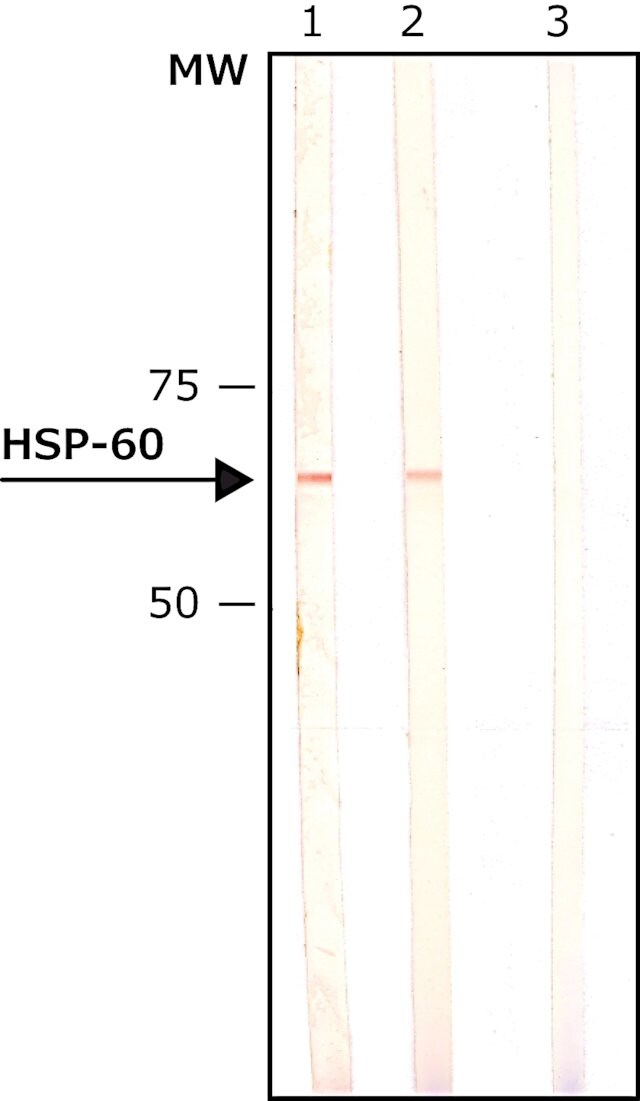您的位置:首页 > 产品中心 > Monoclonal Anti-Heat Shock Protein 60 antibody produced in mouse
Monoclonal Anti-Heat Shock Protein 60 antibody produced in mouse

基本信息
| MDL number | MFCD02189138 |
| NACRES | NA.41 |
| General description【一般描述】 | Monoclonal Anti-Heat Shock Protein 60 (HSP60), clone LK2, recognizes an epitope located between amino acid residues 383-419 of the human (corresponding to a.a. residues 356-393 of the mycobacterial) HSP60. The antibody is reactive against the mammalian (e.g., human, rat), avian (e.g., chicken), bacterial (e.g., E. coli), helminths and spinach HSP60. In immunoblotting, the antibody may label additional bands at approx. 38 and 97 kDa. It is reactive with both the constitutive and the inducible HSP60. It shows a raised level of staining in immunohistochemistry of formalin-fixed, paraffin-embedded synovial membranes taken from patients with juvenile chronic arthritis. Monoclonal anti-Heat Shock Protein 60 (mouse IgG1 isotype) is derived from the LK2 hybridoma produced by the fusion of mouse myeloma cells and splenocytes from BALB/c mice immunized with recombinant human heat shock protein 60. |
| Immunogen【免疫原】 | recombinant human heat shock protein 60 (HSP60). |
| Application【应用】 | Monoclonal Anti-Heat Shock Protein 60 antibody produced in mouse has been used in:western blotting, immunocytochemistry, enzyme linked immuno sorbent assay (ELISA) ,immunoblotting |
| Biochem/physiol Actions【生化/生理作用】 | A wide variety of environmental perturbations, such as a sudden increase in temperature, induce cells to rapidly synthesize a group of polypeptides known as the heat shock (stress) proteins. The 60 kDa HSP family (HSP60) which retained a uniquely high level of sequence conservation during evolution is a focus of interest as a potential antigen in a number of autoimmune diseases. Abnormal immune reactivity involving HSP60 has also been implicated in the pathogenesis of schizophrenia. In human arthritis and experimentally-induced arthritis in animals, disease development was seen to coincide with development of immune reactivity directed against not only bacterial HSP60, but also against its mammalian homologue. A human mitochondrial protein, originally designated P1, has been described as the human homologue of the bacterial HSP60, and >45% of the protein has sequence identity with its bacterial homologue (groEL, HSP65). |
产品性质
| Quality Level【质量水平】 | 200 |
| biological source【生物来源】 | mouse |
| conjugate【偶联物】 | unconjugated |
| antibody form【抗体形式】 | ascites fluid |
| antibody product type | primary antibodies |
| clone【克隆】 | LK2, monoclonal |
| mol wt【分子量】 | antigen 60 kDa |
| contains【包含】 | 15 mM sodium azide |
| species reactivity | chicken, E. coli, helminth, human, spinach, rat |
| technique(s) | electron microscopy: suitable immunohistochemistry (formalin-fixed, paraffin-embedded sections): suitable indirect ELISA: suitable western blot: 1:100 using cultured human foreskin fibroblast extract |
| isotype【同位素/亚型】 | IgG1 |
| UniProt accession no.【UniProt登记号】 | P10809 |
| shipped in【运输】 | dry ice |
| storage temp.【储存温度】 | −20℃ |
| Gene Information | human ... HSPD1(3329) rat ... Hspd1(63868) |
产品说明
| Disclaimer【免责声明】 | Unless otherwise stated in our catalog or other company documentation accompanying the product(s), our products are intended for research use only and are not to be used for any other purpose, which includes but is not limited to, unauthorized commercial uses, in vitro diagnostic uses, ex vivo or in vivo therapeutic uses or any type of consumption or application to humans or animals. |
安全信息
| Storage Class Code【储存分类代码】 | 12 - Non Combustible Liquids |
| WGK | nwg |




